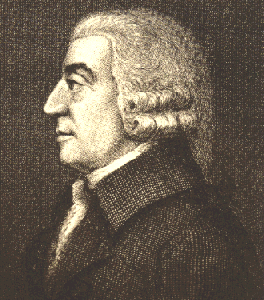Economics : The Crucification of Adam Smith

nowadays only in rare occasions do you get well-paid, well-fed journalists in well-resourced, mainstream newspapers writing intelligent articles. instead one has to increasingly turn to independent newspapers like Arthur. below is a very nice article.
October 04, 2006
The Crucifixion of Adam Smith
Karl Marx once said, “I am not a Marxist.” Similarly, if Jesus Christ were alive today (assuming he’s not), he would likely say, “I am not a Christian.” I mention these two men because, like Adam Smith, their messages have been significantly bastardized to stand for the opposite ideas the men originally intended. While Christians have the New Testament and Communists have the Manifesto, Capitalists prefer to legitimize greed by citing Smith’s seminal work Wealth of Nations; indeed, it is the capitalist bible.
These three works are interrelated in that The Communist Manifesto is used to counter capitalist doctrines while Christianity and capitalism required each other for colonialism (not to say that communists haven’t participated in colonialism). Though Smith’s Wealth of Nations is often used to justify contemporary capitalism, one only has to read the book to realize that the state of modern capitalism would horrify Smith; many of the things he warns about in the book exist today.Because Wealth of Nations begins with Smith’s theory on the “division of labour” those who have read specific parts of the book uphold the division of labour as a perfect hypothesis.
What these readers have missed is Smith’s condemnation of the division of labour later on in the book where he predicts it “will turn working people into objects as stupid and ignorant as it is possible for a human creature to be,” and therefore the government is responsible for preventing this in civilized society. In defiance of Smith’s warnings, we see the division of labour creating mindless factory jobs within our society, while it is taken to its logical extreme in the form of Free Trade Zones around the world. In some countries, workers who must repeat the same minute action thousands of times a day have become physically (and mentally) crippled.
Another famous line lifted from Smith is the oft-quoted phrase “the invisible hand.” Though the phrase only appears once in the entire book, Wealth of Nations does praise the idea of “free” markets: “no regulation of commerce can increase the quantity of industry in any society beyond what its capital can maintain. It can only divert a part of it into a direction into which it might not otherwise have gone: and it is by no means certain that this artificial direction is likely to be more advantageous to the society than into which it would have gone of its own accord.”
While the idea of “free markets” may be feasible, we will never know for it only exists in the speeches of politicians. The 200 years of trade protectionism and government intervention waged by the Western governments would be excusable today if indeed they had evolved into the free market system. The American government’s massive subsidies towards high-tech production masked by pentagon defence spending exemplifies the fact that the “Global North” is nowhere near a real free trade system; especially when it comes to preventing the “Global South” from enjoying a reasonable piece of the world economy
In fact, the only countries that have come close to trying free market values are those poor, indebted countries where the International Monetary Fund’s (IMF) Structural Adjustment Programs (SAPs) were implemented. In those countries the effects of SAPs, for the most part, have been devastating.Another repressive factor in contemporary capitalism is the corporation. Though Smith only criticizes corporations briefly in Wealth of Nations, for harsh criticisms, one must only read founding father and American president Thomas Jefferson’s observations.
However, Smith does write about an issue entwined in the corporate situation of today: local capital. In his analytical introduction to Wealth of Nations, Andrew Skinner notes that Smith believed “the home trade of consumption was to be preferred since it only served to replace domestic capitals. The foreign trade of consumption was ranked second…” This utterly defies the current globalized system where trans-national corporations, free trade agreements and draconian measures imposed by the World Bank and IMF insure that capital flight is a prevalent problem in the rural North and the Global South. Susan George estimates that the $400 billion transferred from South to North between 1982 and 1990 is “the equivalent in today’s dollars of some six Marshall Plans provided by the South to the North.”
The final insult to Smithian ideas is the contemporary divorce between economics and morality. Andrew Skinner points out, “more serious still was the fact that the classical orthodoxy made it possible to think of economics as quite separate from ethics and history, thus obscuring Smith’s true purpose.” Though Smith had an undeniable talent in political economy he was predominantly a philosopher of ethics as seen in his 1759 book The Theory of Moral Sentiments. The philosopher Terrence Hutchinson describes Smith as having been led by an “invisible hand” to promote ends in which he would never have agreed with.
It is exasperating that equality advocates within the market economy are called “idealists,” when it is really the doctrine of Neo-Classical Economists that proves entirely theoretical. Trickle-down theories that propose a high concentration of wealth to a few individuals with the belief that resources will find their way to the beleaguered majority are more utopian than our belief that the only way to equality and justice is through equality and justice. Indeed, equality and justice have existed in certain circumstances whereas successful implementation of trickle-down theories never has.
That record levels of poverty exist, while there have never been more billionaires, proves this point. The bastardized messages of Adam Smith, Karl Marx, and Christ, made by the Capitalists, Soviets/Maoists, and Christians respectively, led me to an easy truth: even straight-forward ideas are susceptible to exploitation when placed in the hands of centralized power. I ask only that capitalists justify their beliefs for what they are: greed or ignorance; and not the ideas of Adam Smith. Indeed, if Adam Smith were alive today he would surely say, “I am not a Capitalist.”
If you would like to explore this issue further, I suggest reading Adam Smith’s Wealth of Nations, Patricia Werhane’s Adam Smith and His Legacy From Capitalism, and Noam Chomsky’s Profit Over People.
Paul C. Gray

0 Comments:
Post a Comment
<< Home